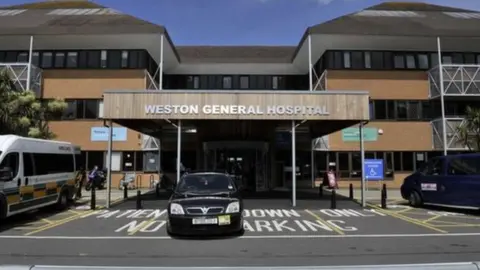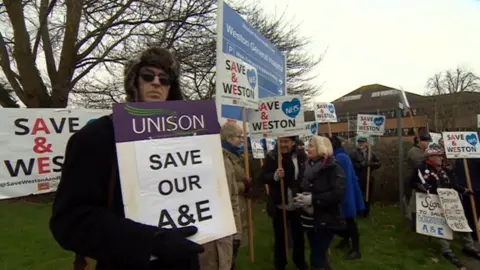Weston Hospital A&E permanent overnight closure 'preferred option'
 Barbers
BarbersThe permanent overnight closure of a West of England hospital emergency department is the preferred option of local NHS managers.
Weston General Hospital A&E unit has been shut overnight for 18 months because it could not guarantee safe levels of staffing.
The area's clinical commissioning group now wants the closure to be permanent, saying it will improve patient safety.
It is to consider the proposals at a meeting next week.
Under the plans, serious emergencies would continue to be transferred to neighbouring hospitals.
A lack of specialist staff could also see intensive care provision at the hospital halved, with patients treated elsewhere.
Bristol, North Somerset and South Gloucestershire Clinical Commissioning Group outlined the proposals in a statement detailing the "preferred option we are putting forward".
It said the plans had been "shaped by doctors, health and care professionals and the public".
Medical director Martin Jones said: "We know that staff at the hospital do a fantastic job every day, yet Weston Hospital is unable to meet national clinical quality standards across all its services.
"We need a genuine 21st Century service that meets the needs of our patients now and in the future, and we believe our proposals will achieve that."
'Centre of excellence'
Weston General's A&E has been closed between 22:00 and 08:00 since July 2017.
People with serious and life-threatening emergencies are told to dial 999 and ambulances will take them to Bristol or Taunton - about 20 and 28 miles away respectively.
Other plans under consideration include developing the hospital as a "centre of excellence" for elderly patients, and increasing access to specialist outpatient services.

The hospital's consultants' body has written a letter of concern saying it fears that if acute services "collapse", other services could drop below a critical mass necessary for the hospital to function properly.
If agreed, the "preferred option" will proceed to public consultation later in February.
